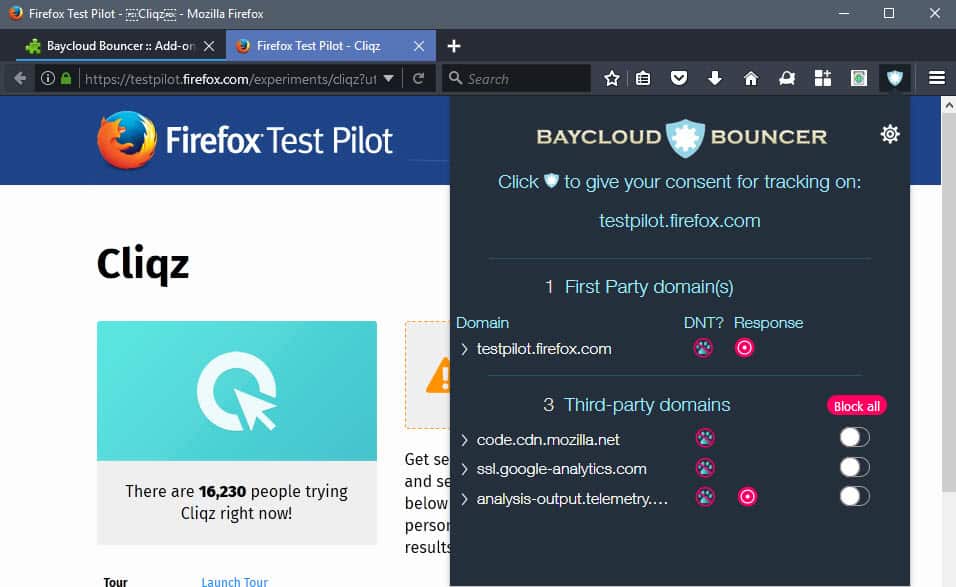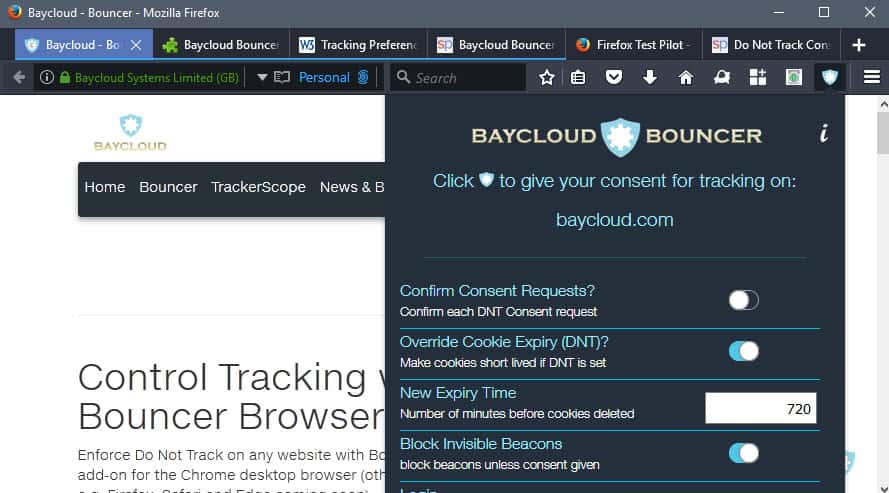Baycloud Bouncer is a web browser extension for Firefox, Chrome, and Edge, that give you full control over online tracking.
Online tracking, through the use of browser cookies or otherwise, is so common in this day and age that you are hard pressed at finding advertising services or popular sites that don’t track users in one way or another.
Do Not Track was designed with good intentions. It is a value that is transferred with header information when programs connect to sites. If set, it tells the site that the user does not want to be tracked. Most modern browsers support Do Not Track. Google introduced Do Not Track in 2012 in Chrome, and Mozilla in 2011 in the Firefox browser.
For this to work however, sites need to support Do Not Track technically, and also support what it is supposed to do.
Mozilla revealed results of a study back in 2013 that showed that no more than 20% of users sent Do Not Track headers with their requests.
Baycloud Bouncer

Baycloud Bouncer is a WebExtension for various web browsers that implements the Do Not Track Consent API. Essentially, what that does is block tracking through the use of cookies unless consent has been given by the user.
This goes one step further than asking sites not to track, as it will block tracking unless allowed by the user of the browser.
Servers may use the API to prompt for permission, and if permission is granted, persistent cookies or other techniques may be used to track the user.
Baycloud Bouncer acts as a bouncer that controls this. It blocks any site from trying to set persistent cookies or use other means of tracking if explicit user consent has not been given.
Any embedded content, that means third-party content such as ads that are displayed on a site, are only given site-specific consent according to the description of the add-on.
Additionally, Bouncer will also enforce the Do Not Track signal and not only communicate it to the sites the browser connects to. This means that persistent cookies will only be allowed for a maximum of 2 hours if set.
The application adds an icon the browser’s main toolbar that you may click on to manage the behavior. The interface lists all first and third party domains connections have been made to, whether Do Not Track is supported, what a site’s response was, and options to block specific sites directly.
You can allow a site to track you with a click in the interface, and revoke the permission as well again at a later point in time.
Options

Baycloud Bouncer ships with a bunch of preferences and options to configure the extension’s blocking of tracking further.
Here is a short overview of the supported options:
- Confirm Consent Requests — Whether to confirm any consent request.
- Override Cookie Expiry — If Do Not Track is set, let cookies expire after 720 minutes (change the time period).
- Block Invisible Beacons — If no consent is given, block beacons that are not visible.
- Block if Pings are Detected — Block if pinging is detected.
- Don’t send 3rd party cookies — Block third party cookies if Do Not Track is set.
- Changing Do Not Track also changes 3rd Parties — If you whitelist sites, whitelist also applies to third parties.
- Notify Fingerprinting — If Fingerprinting is detected, notify the user.
- Notify 1st party Fingerprinting — Notify if first party fingerprinting is detected.
- Replace Path in Referer Header — Whether to hide the referring site in the header.
BayCloud Bouncer can be downloaded for Mozilla Firefox from Mozilla AMO, and for Google Chrome for the Chrome Web Store.
Verdict
Baycloud Bouncer offers better protection against tracking than the Do Not Track header. Its extra features, besides that, and the flexibility it provides in regards to tracking, may make it attractive to some Internet users.
Even users who have disabled third-party cookies may find it useful, as it may help when it comes to first-party tracking, and other tracking methods as well.
Now You: How do you handle tracking on the Internet?